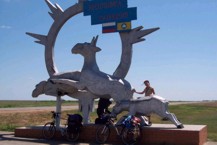
The Kalmoukie border, in the middle of nowhere - Thècle poses with our bikes
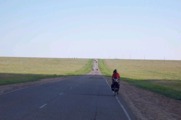
So now do you believe me when I say that Kalmoukie is empty? When's the next "shoppe"? Impossible to say, so, not really needing an excuse, we stopped systematically at every
"shoppe".
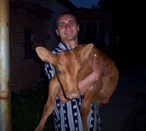
Our host, a Russian born and bred - in a Kalmoukie village. There is more livestock farming than crop growing in the region since the climate is very dry. It is nothing like the land just a few kilometres to the east (see previous tales).
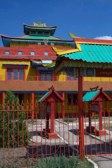
120 Llama monasteries and temples were destroyed in the 1930s. The temple of Elista was only re-opened in 1989. Whether Buddhist, Muslim or Orthodox, the Russians that I've met seem to be about as practising as the French. I guess several decades of Soviet rule might have something to do with this. The photo shows one of the rare temples we came across on our route.
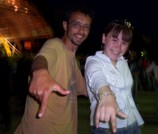
Teenagers in Elista, the capital of Kalmoukie in the middle of the steppe, took over the town's main square to celebrate the beginning of their holidays. I'm dancing with a half-Russian, half-Kalmoukie
woman.
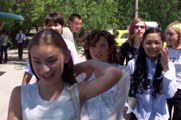
Native Russians and Kalmouks live together in perfect harmony in the capital… People here are very approachable, and we keep getting into conversations in Russian. Like all the Russians that I've met, they absolutely love living in their town.
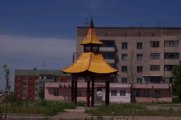
All over Elista, there are little buildings with an Oriental touch, although not that many that get it right. Located right in the centre of Kalmoukie, the city was hewn out of the steppe in 1926.
|
|
|
 May, 26 May, 26
Yellow fever
Between arriving in Volgograd from the West and leaving to the South, it's a different world… Gone are the fertile valleys teeming with workers, and ahead lies a vast plateau of green steppe swept across by a wind that never drops
(and never blows in the right direction either, of course). A few dozen kilometres from Volgograd, a simple sign tells us that we are now in Kalmoukie, a corner of Russia that boasts a strong sense of
autonomy. There are many autonomous Republics and Regions in the country. The label implies a specific ethnic, religious or historical community. The reason for the existence of the autonomous Republic that we are crossing now is the presence of an influx of people from Mongolia who came here during the 17th century in search of fresh
pastures. And it's true that, just a few kilometres over this “border” in the middle of nowhere, the slanting eyes of the first shopkeeper we came across left no doubt as to his
origins.
During our four-day journey across the steppe (the very same steppe that inspired the New Kids On The Block song, Step by Step), we stopped at just about every roadside café. Kalmoukie is two and a half times bigger than Belgium but has less than 400,000
inhabitants, so there aren't that many for the passing cyclist to stop at, nor that many villages!
The hamlet where we stopped for the first night was inhabited practically 100% by native Russians. The region's two main peoples mingle in Elista, the local capital. There, pretty
yellow- and white-skinned couples bill and coo on the public benches, ands it around drinking beer together. The Mongols have been deeply assimilated into Russian culture. In Elista, young people rarely speak Kalmouk and the Buddhist temple, a few kilometres out of
town, seemed pretty deserted. In town, the only tangible remnants of Mongolian culture are some Oriental-style modern buildings, a few culinary specialities (I thought there wasn't enough sugar in my tea – in fact it was
salted), etc. However, this way of life, the same as people all over Russia, does nothing to stop them referring to themselves as Kalmouks, remembering which Mongolian tribe they come from and sometimes wearing little Buddhist
medallions. One thing is for sure – we are definitely in Asia!
Thècle, with her yellowish skin and Mongolian features (her beautiful almond-shaped eyes, as she told me to write) keeps being mistaken for a Kalmouk. However, she doesn't wear traditional Mongolian costume, namely a mini-skirt with a low-cut top. Before backtracking across the region by a different route, we treated ourselves to a day off in Elista. Your average urban Kalmouk is extremely friendly and
approachable. Everyone thought we were here for the Women's World Chess Championships that are on right now… It is true that you would normally have to have a good reason to come all this way across the steppe to see and admire Elista. Especially on a bike!
|
|
|
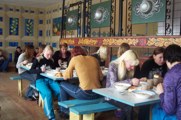
The last village stop before Volgograd, waiting for the rain to let up, some students invited me for lunch at their canteen. Potato soup, pea soup and hot chocolate and rolls were on the menu. It's been a very liquid
day.
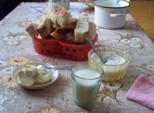
Breakfast with my Turkish friends: bread, butter, milk and sugar. And it's all organic, naturally.
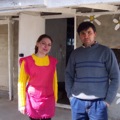
At the roadside, a Russian-Uzbek couple run a stall for the workers in the fields and passing motorists. This morning, this young cyclist had a hearty breakfast of eggs, bread and coffee.
|
|
|
 may,
21 may,
21
Volgograd
Back in the USSR in the backwoods of Russia
A week has passed between Rostov-sur-le-Don and Volgograd, deep in the Russian countryside, a place where no tourist would ever think to venture. The villages are few and far between, the land is flat
(only the wind decides whether my day will be heaven or hell), and the only landscape can be summed up as green fields as far as the eye can see. From time to time, you can see a little old man among the
crops. In fact, I ended up staying with one a few days ago. He was Turkish and his family lived in Uzbekistan for generations. But for the last 15 years, he has been here with his
family, growing tomatoes in his own small field or in his boss's much bigger field. His house is right on the edge of an amazing village that is full of Turks from Uzbekistan and where the Russians are now in the
minority. Cohabitation is not without its problems but, he told me, "they quite happy about having Turkish labour here." There's a hint of the exotic in the family: the mother
(and grandmother) is Uzbek and has typical Asiatic features. The people in this little community speak a mixture of Turkish, Russian and Uzbek. As for me, I had to sleep with the kids.
Generally speaking, this entire fertile valley is a mélange of peoples from the former USSR which, ironically enough, has occurred since the break-up of the country. In addition to the
Tchechens, I have met Ingushians
(two Russian provinces), Tajiks, Armenians and Uzbeks, to name but a few.
I like to open doors. I don't even have to try very hard any more to meet people. It just happens naturally. The day before yesterday, I spent the night in the home of an old Russian lady, a retired vet aged 60. I did a symbolic spot of gardening for her and helped repatriate some chickens that had got into the
kitchen. Then we chatted for hours. My Russian is getting so good now that I can have more interesting, especially when the person I am talking with can manage to communicate on my
level. I'm beginning to understand that Vladimir Poutine, although not unanimously popular, nonetheless enjoys a certain prestige. People are grateful to him because of his battle against corruption and the economic growth seen in the last few
years. On the other hand, of all the people I've met, no one has stood up for either Gorbachev or Yeltsin!
Apart from that, I spend most of the day on my bike. Every now and then, someone pulls up in their car to chat with me (one man even offered me money to sponsor me, but I refused it) and of course, I have to stop for autograph breaks quite
often. My new travelling companion, Thècle, joined me yesterday in Volgograd. She'll be with me as we enter another Russia, a distinctly Asiatic region known as Kalmoukie.
But you'll just have to wait, my lips are sealed…
|
|
|
|
|
|
|
 may,
13 may,
13
Rostov-on-Don
A new country, a new family
I left the vast rolling fields of the Ukraine behind me to travel across the vast rolling hills of
Russia. There's been no break – it's the same landscape, same little old ladies with their multi-coloured
headscarves, the same language… It's fascinating to see how Russian culture has spread its tentacles over millions of people, regardless of
borders. This makes it an incredibly rich culture, but can also entail a certain “arrogance” here and
there. Russian speakers don't need anyone else, and everywhere I've been, very few of them speak
English, not even among the youngest kids.
After spending a night in my tent beside the Azov Sea which is teeming with silvery fish
(and the occasional drunken teenager, but this is a minor detail that I've given up taking any notice of), I'm now staying in
Tagenrog. Everyone will tell you that Tagenrog is a really small
town. And they'd be right – it is but a mere speck in the middle of nowhere in this immense country. Even
so, it stretches for miles and each district is like a town centre. There are 300,000 inhabitants (about the same as in Lausanne and the surrounding
region) and it even has three football stadiums. This poky town is proof that I have crossed a border and the scale of things is quite
different. Gone are the towns plunged in darkness. Here, it is dark with so many people.
I am actually sleeping in one of the stadiums. I spent all day sorting out administrative problems to register my arrival in the country. The moment we met, the man at the immigration office booted me out the door with a kick in the most sensitive part of my body (I mean my
bum, of course) whilst explaining to me, in Russian, what I was supposed to do. I had to call out Number One and Number Two at the stadium
(the director and assistant director), as well as Numbers Six and Twelve of the local team
(whose muscles are almost as impressive as mine) to get through this Kafka-esque
process. These good people saved my life! Now I am well and truly part of the great family of sportsmen. All I need now is a supermodel for my
wife.
Dreaming apart, at the moment I am writing to you sat in the warden's hut at the mosque in Rostov-sur-le-Don, which really is a big port with over a million
inhabitants. The Muslims here (and they are genuine ones since they don't even drink vodka!) are Tatars
(yes, yes, more Tatars, but these are not Crimean Tatars!),
Tchechens, Uzbeks and Daghestanis, etc. They say they live here in peace and
harmony. The warden at my mosque is from Pakistan. He ended up here after a bad road accident forced him to give up his business. The mosque
(built using funds from Turkey) is brand new. The old mosque was confiscated by the communists and is now an army club, much to the distress of my hosts.
So, I'm still meeting lots of amazing people. I'm leaving this town
today, to continue for a few days through the countryside and on to new adventures…
I've been asked to include more descriptions of the landscape and more anecdotes in my traveller's tales… I'll
try. The region here is all undulating hills and dales, but I hardly even notice. As I
said, I belong to the great family of sportsmen now!
|
|
|

With my Tatar family, here is the daughter (right) and her best friend, a Russian girl… well, a Russian-speaking Ukrainian actually… If you've been with me from the
beginning, you'll know what I mean!
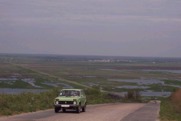
Crossing marshland near the Azov Sea, a sea within the Black Sea… Note the traditional and ubiquitous Lada in the foreground
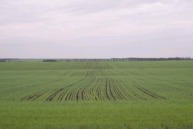
A wheat granary dating back to days of the USSR - the Ukraine is still very bucolic. I have mainly been cycling through a landscape of fields.
The Ukrainian flag (yellow at the bottom and blue at the top) symbolises a field of wheat under the blue sky!
|
|
|
 may,
8 may,
8
Mariupol,
Tea with the Tatar
I really didn't want to leave the Crimea without having met some Crimean Tatars, who have Asiatic features and are descended from the Mongols (who ruled over the region in the 12th century or
thereabouts) and the local population of Turkish origin who were already settled here back then. Would you believe it, but one pulled up to the roadside in his Lada, intrigued by my “Odessa-Tashkent”
pennant. It was 3 in the afternoon and I had the munchies really badly, so I invited myself to his house for tea. For a long time, the Tatars were the only people to live in the
Crimea. They even had their own republic here at one time (protected by the Ottoman Empire). Then, in the late 1870s, the Russians invaded the region, instigating colonial politics and destroying the Tatar culture in the
process. They were quickly reduced to a minority. Under Communism, a period of cultural renaissance gave way to a period of persecution. After the Second World War, Stalin deported my
family, like most of the Crimean Tatars, to Uzbekistan (others were deported to Kazakhstan or Siberia).
Stalin accused the people of "collaborating with the enemy". In the last fifteen years, many have come back, often in extremely rough conditions. My family came back in 1988. They now have a flower stall where they sell flowers that they grow
themselves. The youngest daughter, aged 13 and who has the most beautiful eyes, was born here. She spoke a little English and stuck like glue to her best friend, a Russian girl.
Sitting around the table, there was the mother and father, grandmother, the brother and some family friends. They spoke a mixture of Tatar and Russian among themselves. Nothing in the house was typically Tatar, they are Muslim but their copy of the Koran is written in Arabic and they don't understand
it, and we all knocked back a shot or two of vodka… All that really appears to connect them to another culture are their Asiatic bone structure, the music they played and some traditional dishes
(meatballs and pasta, mmm!).
Is it possible for a people to survive for long like this? Yes, because their feeling of belonging to a distinct culture has survived throughout all the years spent in exile. Even in the absence of any outward
sign, they are proud to be “Crimean Tatars”.
Some Slavic Ukrainians manifest a more or less veiled racism, but I reckon it is pretty limited when you consider what might have happened as a result of such a mass influx of people. My family are not interested in the political struggles that have divided the region in recent years – they prefer to live peacefully in this village that is mainly inhabited by
Russians. Anyway, I left feeling very happy to have met them, and with a balloon that the daughter gave me tied to the handlebars of my bike…
I do try to make these tales brief and interesting. If I didn't control myself, I would tell you a thousand and one other little things about meeting people like this or about things that happen on the journey… My nights of pitching my tent anywhere I can are quite
eventful. Last night, as I settled down for the night within sight of a woman who runs a bistro, in a room shared with a jukebox man and the barman, I thought that finally I was going to get some shut-eye… In my
dreams! – Boss lady has to sleep with the telly on all night! Add to this is the fact that I have started to dream in Russian and you will understand why, at times, I really haven't got a clue what is going on
anymore.
I have come 1,300 kilometres since setting out, as my legs may well tell you. That's an average of 60 kilometres a day, mainly travelled, as today, in the rain. It's tough,
physically, but the warmth and friendliness of everyone I've met more than makes up for that!
|
|
|
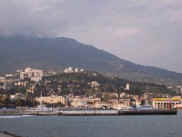
The beautiful city of Yalta, between the sea and the mountains.
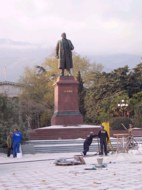
The statue of Lenin, in Yalta. There are still plenty of communist monuments in the country. As far as the Ukrainians are concerned, pulling them down would be tantamount to a denial of the
past.
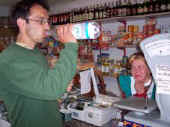
You won't get to see many photos of me now that Matthieu has left me on my own. My hands and face are beautifully tanned and my muscles are more impressive than
ever.
|
|
|
 may 2nd may 2nd
Feodossia,
Slaving away in the Crimea
Matthieu has left for sunnier climes, saying that he already misses this land where "it's just like living in a pop video" since the women tend to dress about as demurely as Britney
Spears. Our first night after leaving Sebastopol, however, was spent in a setting that couldn't be much more testosterone-filled if you tried (even though there was no alcohol
involved, much to our surprise). We slept with some workmen at a building site. Conversation was a tad limited, but we did manage to amaze them. Everyone around here seems to be putting up buildings with a sea view (as our hosts
were), building houses, digging holes only to fill them back in at some point in the future, or even (and these were our favourites) driving huge lorries down the winding coast roads… Amid much noise and commotion, the coastline is being turned into a concrete jungle. The towns and shopkeepers are getting ready for the summer
season, whereas the wealthy are planning for their retirement in the sun. I should mention that the coast here, with its green mountains covered in swathes of vineyards that plunge dramatically into the
sea, is quite magnificent.
Yalta is also under construction, especially the 200-metre strip of land that separates the statue of Lenin and McDonald’s (in fact, what's 200 metres in terms of shattered lives or renewed
hopes?). I wondered what lay behind the name, Yalta, which used to crop up repeatedly in history and geography lessons in the sixth form. It is quite a large and luxurious seaside
town. We visited the site where the famous eponymous treaties were signed at the end of the Second World War. Livadia Palace was built for Nicolas II, but he only had the chance to enjoy it on four occasions before the Bolsheviks assassinated him together with his wife and five children
(aged between 14 and 23). The museum sets up a studied balance between the history of the royal family and the peace treaties. You recognise some of the halls from archive photos that are also on display.
Physically, I am going through the worst part of the entire journey. After Matthieu left, I spent three totally horrendous days cycling through the mountains. I think I have probably exhausted what remained of my physical and psychological reserves… It's a shame that I'm the only person that realises what an incredible feat I have accomplished…
Anyway, I'm looking forward to receiving your emails more than ever. I may not always be able to reply since the connections are really slow. But it does me a power of good to feel that someone is out
there. Also, don't forget to check out the chat forum which has just been opened and let me (us) know any comments you may have about this project!
I'd just like to say a big thank you to our sponsors: Catherine, Brigitte and Thierry, Philippe and Isabelle, Graziella and Paulette.
|
|
|
![]()
![]()
![]()
















